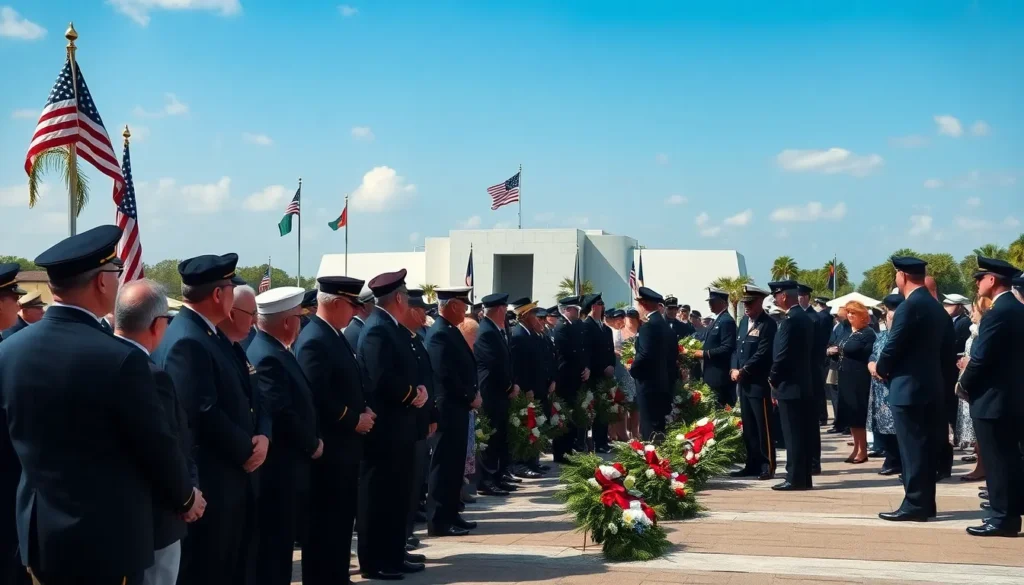Table of Contents
ToggleDecember 7th holds a significant place in history, often remembered for its pivotal events and cultural importance. As the year winds down, this date serves as a reminder of both reflection and anticipation. People frequently wonder what day December 7th falls on in any given year, making it a topic of interest for planners and historians alike.
In 1941, December 7th became etched in the collective memory as the day of the attack on Pearl Harbor, a turning point in World War II. This date not only marks a moment of remembrance but also sparks discussions about its implications in contemporary society. Understanding what day December 7th is can lead to deeper insights into its historical context and significance.
Overview of December 7th
December 7th marks several significant events in history, most notably the attack on Pearl Harbor. This surprise military strike by the Imperial Japanese Navy occurred in 1941, leading the United States to enter World War II. The attack resulted in the loss of 2,403 American lives and substantial naval damage, making it a critical turning point for the nation.
Commemoration activities include memorial services held annually at Pearl Harbor to honor those who lost their lives. Schools and organizations often conduct educational programs to teach about the events of that day and their consequences, underscoring the importance of remembrance.
In addition to its World War II significance, December 7th serves as a date for various cultural observances. The Feast of Saint Ambrose, celebrated by some Christians, occurs on this date. Additionally, it is National Pearl Harbor Remembrance Day in the United States, dedicated to reflecting on the lessons learned from that historical event.
Understanding December 7th illuminates its ongoing relevance in discussions about war, peace, and historical memory. The date invites reflection on the sacrifices made and the importance of peace in contemporary society.
Historical Significance

December 7th serves as a critical date in history, marked by significant events that shaped the course of nations. The date prompts reflection on both past and present.
Attack on Pearl Harbor
The attack on Pearl Harbor on December 7, 1941, stands as a defining moment in American history. Japanese forces launched a surprise military strike against the U.S. naval base in Hawaii, resulting in the loss of 2,403 American lives and damage to multiple ships, including eight battleships. This event prompted the United States’ formal entry into World War II, marking a crucial shift in global conflict dynamics. The attack symbolizes resilience and the importance of vigilance in national defense, making the date a cornerstone of historical commemoration.
Other Notable Events
December 7th also marks other significant occurrences. The Feast of Saint Ambrose, celebrated within the Christian tradition, commemorates the life of the Bishop of Milan, emphasizing themes of faith and leadership. Additionally, National Pearl Harbor Remembrance Day, observed each December 7th, honors the sacrifices made during the 1941 attack. This observance promotes awareness of military history and the valor of those who served, reinforcing the date’s multifaceted cultural significance.
Observances and Holidays
December 7th is marked by significant observances in the U.S. and globally, reflecting themes of remembrance and cultural importance.
National Pearl Harbor Remembrance Day
National Pearl Harbor Remembrance Day takes place on December 7th each year to honor those who lost their lives during the 1941 attack. This day entails ceremonies at memorial sites, with many Americans paying tribute by observing a moment of silence at 12:55 PM, the exact time of the attack. Educational institutions often conduct programs to promote awareness of military history as well as the importance of peace. The day serves as a reminder of the sacrifices made and the enduring impact of war on society.
Global Observances
Globally, December 7th also hosts various observances, including the Feast of Saint Ambrose, celebrated by many Christian communities. This feast honors Saint Ambrose, a prominent early Church Father, recognized for his role in the development of Christian doctrine and leadership. In addition, some countries recognize this date for various cultural or local events, facilitating an opportunity for reflection on peace and resilience across diverse cultures.
Cultural References
December 7th enriches cultural narratives through literature, media, and memorable quotes. These reflections resonate with the date’s historical significance and the ongoing themes of resilience and remembrance.
Literature and Media
Literary works and films often depict the impact of December 7th. Titles like Pearl Harbor by Randall Wallace dramatize the events and emotional aftermath of the attack. Documentaries, such as Remember Pearl Harbor, provide historical insight and personal stories, deepening public understanding. Numerous articles and novels explore themes of sacrifice and courage, reflecting the valor displayed during World War II. This date also appears in various cultural contexts, emphasizing its role in shaping national identity and memory.
Famous Quotes
Famous quotes encapsulate the spirit of December 7th, highlighting its significance. President Franklin D. Roosevelt’s declaration, “A date which will live in infamy,” preserves the memory of the attack and its implications. Other notable figures have remarked on the themes of vigilance and unity, emphasizing the importance of remembrance. These quotes serve as powerful reminders of resilience, urging society to reflect on past sacrifices and promote peace.
December 7th stands as a poignant reminder of history’s lessons and the sacrifices made for freedom. Its significance extends beyond the events of 1941, resonating through cultural observances and educational initiatives that promote awareness and reflection. The date encourages individuals to honor those who served and to embrace the values of resilience and peace.
As society remembers the past, it also looks forward, fostering a commitment to understanding and preventing conflict. December 7th not only commemorates a critical moment in history but also inspires ongoing discussions about unity and vigilance in the face of adversity.




